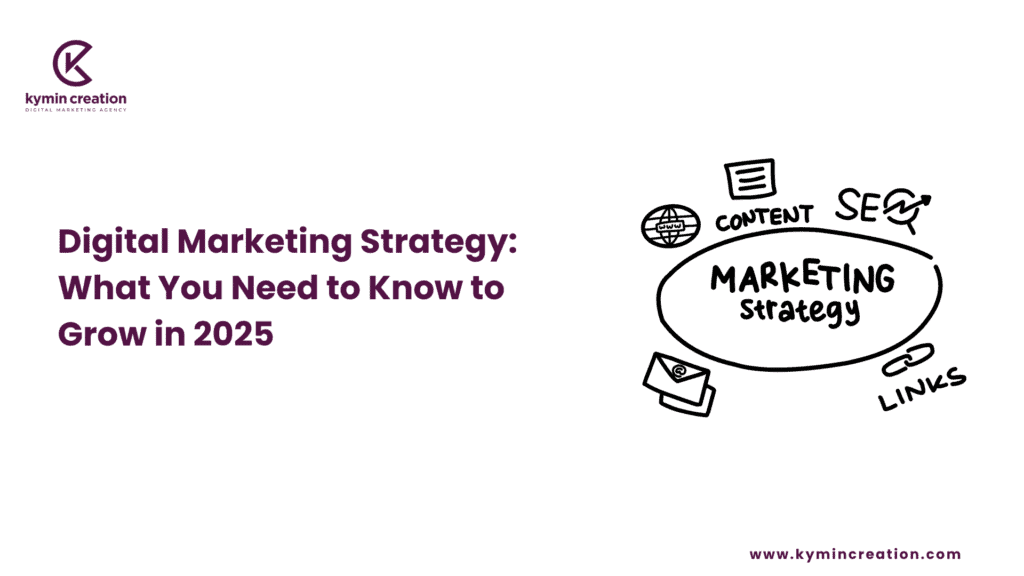Digital Marketing Strategy: What You Need to Know to Grow in 2025
In today’s hyper-connected world, having a solid digital marketing strategy is no longer optional — it’s the foundation of sustainable business growth. Whether you’re a startup founder, a local business owner, or managing a growing brand, understanding what makes a digital strategy effective will help you stay competitive and increase your ROI.
Let’s break down everything you really need to know to build a winning digital marketing strategy in 2025.
Why a Digital Marketing Strategy Matters More Than Ever
A digital marketing strategy isn’t just a list of tactics — it’s a roadmap for how your brand shows up online. With more consumers researching and purchasing digitally, your strategy defines how you attract, convert, and retain customers.
Here’s why it’s essential:
- Ensures consistent branding across all digital touchpoints
- Helps you allocate budget and resources effectively
- Aligns your online efforts with business goals
- Tracks and improves performance through data-driven insights
Without a strategy, you’re just “posting and hoping.” With one, you’re growing with purpose.

Key Elements of a Powerful Digital Marketing Strategy
A high-performing strategy covers multiple channels and tactics — but it’s not about doing everything. It’s about doing the right things well. Here’s what a complete digital strategy should include:
1. Clear Business Goals and KPIs
Start with the “why.” What are you trying to achieve? Common digital marketing goals include:
- Generating qualified leads
- Increasing online sales
- Boosting website traffic
- Improving brand visibility
Once you have goals, define measurable Key Performance Indicators (KPIs). For example:
- Website conversion rate
- Cost per lead (CPL)
- Return on ad spend (ROAS)
- Organic search rankings
2. Target Audience Research
Understanding your audience is critical. Build detailed buyer personas by researching:
- Demographics (age, location, income)
- Pain points and needs
- Online behavior and buying habits
A good digital marketing strategy for local businesses will also include local SEO tactics tailored to specific regions or cities.
3. Website Optimization and UX
Your website is the digital hub of your business. Ensure it’s:
- Mobile-responsive
- Fast-loading
- SEO-optimized
- Clear in messaging and CTAs (Calls-to-Action)
User experience (UX) plays a major role in conversion. A confusing layout or slow load time can cost you leads.
4. Search Engine Optimization (SEO)
No digital strategy is complete without SEO. Use a mix of:
- On-page SEO (title tags, meta descriptions, internal linking)
- Technical SEO (site speed, mobile friendliness, crawlability)
- Off-page SEO (backlinks from authority sites)
Include longtail keywords like “affordable digital marketing strategy for startups” or “local SEO strategy for service providers” naturally within your content.
5. Content Marketing Strategy
Content is still king — but only if it’s relevant and valuable. Your content plan should focus on:
- Blogging (educational and keyword-optimized)
- Video marketing
- Case studies and client testimonials
- Infographics and visual content
A strong content marketing strategy builds trust and authority while supporting your SEO efforts.
6. Social Media Marketing
Be where your audience is. Use platforms like:
- Instagram for visual brands
- LinkedIn for B2B services
- Facebook for community engagement
- YouTube for how-tos and brand storytelling
Maintain a consistent posting schedule and engage with your audience to boost visibility and trust.
7. Paid Advertising (PPC + Meta Ads)
Want fast results? Add pay-per-click (PPC) campaigns or Meta Ads to your digital plan. Use:
- Google Ads for search intent traffic
- Facebook/Instagram Ads for brand awareness
- Retargeting to bring back interested visitors
Paid campaigns should be optimized continuously to avoid wasted budget.
8. Analytics and Performance Tracking
Use tools like Google Analytics, Search Console, and Meta Business Suite to monitor:
- Website traffic sources
- Campaign performance
- Conversion rates
- Audience behavior
Track. Analyze. Optimize. Repeat.
Common Mistakes to Avoid in Your Digital Marketing Strategy
Even the best marketers make mistakes. Avoid these to keep your strategy strong:
- Chasing trends without understanding their impact
- Ignoring data and analytics
- Posting without a content calendar
- Not optimizing for mobile
- Overlooking local SEO opportunities
FAQs About Digital Marketing Strategy
What is a digital marketing strategy?
A digital marketing strategy is a structured plan that outlines how your business will use online channels — like SEO, social media, email, and paid ads — to reach specific goals. It helps you focus your efforts for maximum impact.
How often should I update my digital marketing strategy?
Review and tweak your strategy at least quarterly. The digital landscape evolves quickly, and staying current helps you remain competitive.
Can a small business benefit from a digital marketing strategy?
Absolutely. In fact, a well-crafted digital marketing strategy for small businesses can level the playing field, allowing you to compete with larger brands — especially in local search and niche markets.
What’s the first step in building a digital strategy?
Start with audience research and goal-setting. Understand who you’re trying to reach and what you want to achieve. Then, build out channels and content that support those objectives.
5 Quick Tips to Improve Your Digital Marketing Strategy Today
- Audit your current efforts – What’s working? What’s not?
- Update your website – Make sure it’s fast, mobile-friendly, and optimized.
- Focus on local SEO – Especially if you serve a specific city or region.
- Repurpose content – Turn blogs into reels, infographics, or LinkedIn posts.
- Invest in email marketing – It still delivers one of the best ROIs.
Final Thoughts: Ready to Build a Winning Digital Marketing Strategy?
Your digital marketing strategy should never be “set and forget.” It needs regular refinement, testing, and alignment with evolving consumer behavior and platform updates.
If you’re ready to build a strategy that actually works, let’s talk.
Contact Kymin Creation – the best digital marketing agency in Ahmedabad – and let’s grow your business the smart way.